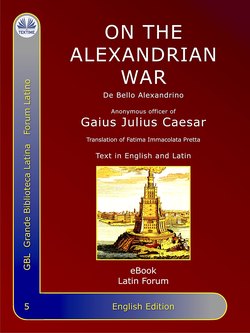Читать книгу On The Alexandrian War - Andrea Pietro Cornalba - Страница 10
What is De Bello Alexandrino
ОглавлениеBellum Alexandrino, as it was called in Latin, is a text of the Corpus Caesarian, generally attributed to Aulo Irzio, although the attribution is uncertain. This third chapter of the war saga tells us in detail some events lived by Caesar in 47 BC. Here, however, an episode occurs outside the dispute between Cesariani and Pompeiani: in fact, it is an internal dispute in the kingdom of Egypt, an Illyrian section against pockets of resistance, a Hispanic entirely within the Cesarian faction and a Pontica concerning Farnace son of that Mithridates won years before by Pompeo.
Caesar found himself embroiled in the intrigues of the Egyptian court, where a difficult dynastic succession was underway in which Rome had to act as guarantor, as requested by the late Pharaoh Ptolemy XII (12). Egypt was already at the time an important wheat supplier for Rome which held a sort of discreet protectorate. We all know the story of Caesar and Cleopatra but here there is no trace of it, Ptolemy XIII (13), Arsinoe and the eunuch Ganymede, Cleopatra are mentioned and only mentioned almost absently, nothing is said of the three-month long journey on the river Nile, indeed reading it seems that Caesar immediately left for Syria at the end of the war.
An interesting aspect is the disdain for the killing of Pompeo and the macabre gift received by the young Pharaoh. Caesar's outrage seems sincere and I think it can be considered a just reaction if we consider that in those days Rome was not so great and that the two were fellow citizens, friends, party companions and even relatives. Then perhaps Caesar did not want the death of a man dear to his fellow citizens who had however made his homeland great, in short, strangers did not have to put their beak in strictly Capitoline affairs.
In any case, for Caesar, the Alexandria war was not easy, he often found himself in difficulty and the pages that describe it are therefore very interesting because they show us how the Romans had reached a much higher strategic level than older but also plastered peoples in habits not suitable to face the tough veterans framed in the legions reformed by Gaius Mario years before.
In a certain way, one realizes that republican practice, with its rules, allowed politicians to compete with each other without annihilating themselves, thus bringing out the qualities of individuals, who were thus also spurred on to competition but each in their own sphere , as a team with many capable players.
After the Egyptian phase there is a small pontic part in which Rome's difficulty in defending the eastern provinces with the defeat of Domizio Calvino is narrated.
Then the text moves to Illyria telling us about the difficult situation of that province after the battle of Farsalo, where the Pompeian fleet commanded by Marco Ottavio and the remains of his army, create quite a few problems for the Cesarian governor of the province who must be rescued by well two contingents.
The fourth part of the book moves to Spain and tells us a very intricate story concerning that province where two Cesarian factions confront each other causing serious damage to their political leader.
The last part is almost triumphant for Caesar that from Egypt, through Syria arrives in Asia and then in that pontic province oppressed by an arrogant king named Farnace who already boasted of his conquests, but whom Caesar defeats in one battle and rather quickly, so much so that when writing to a friend, these words will come: "I came, I saw, I won".
